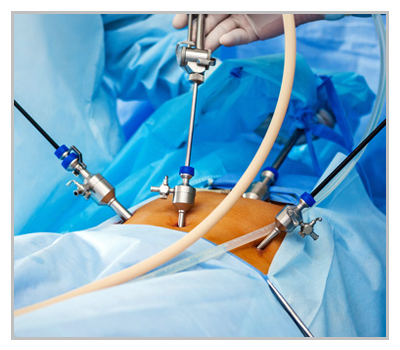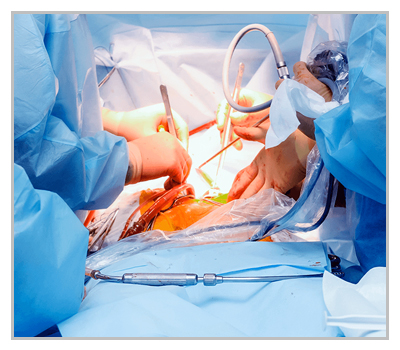Best Laparoscopy for Infertility Treatment in Delhi NCR
Best Laparoscopy treatment in Delhi by award winning Laparoscopic Surgeon Dr. Rutvij Dalal
What is the Laparoscopy procedure?
Visit the top rated IVF Center clinic in Delhi. Laparoscopy is derived from two terms - “Lapara” meaning abdomen and “scope” meaning to see. So simply put, Laparoscopy is inserting a telescope into the abdominal cavity which enables the surgeon not just to inspect and observe, but also operate on almost all abdominal organs by way of specialised laparoscopic instruments. Since all reproductive organs of the female are in the pelvic cavity, Laparoscopy has become the primary and preferred method of operating on organs like the Ovaries, Fallopian tubes, Uterus and upper vagina. Peritoneal diseases like Endometriosis can also be tackled very effectively with laparoscopic technique.
How is Laparoscopy done?
- Patient is admitted in the morning after overnight fast.
- After taking inside the OT, general anaesthesia is given by the anesthetist doctor
- Abdomen is thoroughly painted/draped and prepared for the procedure
- A small cut is made near the navel and trocar inserted
- Carbon-dioxide flow started to distend the peritoneum so that the bowel is pushed away and the surgeon can visualise properly
- Fibre-Optic telescope attached to a high definition camera goes in through the trocar
- If it is a diagnostic Laparoscopy then other ports are not needed and the single trocar will be sufficient to finish the procedure. All the organs like uterus, tubes and ovaries are visualised properly and a video recording made if necessary.
- For operative laparoscopy, other ports are created in the abdomen (small 2 or 3 other cuts) to allow other thin instruments to pass for operative purposes.
- The required procedure is then carried out by the operating surgeon through the instruments and visualising the whole procedure on the LED screen monitor in the OT
- After removing the instruments the cuts in the skin are closed with sutures and patient shifted to recovery room
Diagnostic Laparoscopy
Diagnostic Laparoscopy is done to help in the diagnosis of certain conditions and also for viewing the reproductive organs clearly for unwanted conditions like cysts, scar tissue, endometriosis, adhesions, fibroids and tubercles. indeed, conditions like endometriosis can only be diagnosed by Laparoscopy and sending the sample for histopathology. It is done mainly for following reasons :
- To check for tubal patency (whether fallopian tubes are open or blocked)
- Evaluate adhesions or cysts in the abdomen
- Rule out or evaluate the staging of Endometriosis
- Identity the cause of chronic pelvic pain
- Inspect uterine fibroids and mapping
- Rule out genital Tuberculosis by sending biopsy samples to laboratory
- Rule out malignancy by sending biopsy samples to Onco pathologist

Depending on what we find, we may convert the diagnostic Laparoscopy into an operative one, i.e. treat the pathology in the same sitting so that you won’t have to go for a repeat procedure. So for example ectopic pregnancy if found will be removed, adhesions and fibroids will be removes as far as possible, and if tubes are blocked we will try to join them if feasible.
Operative Laparoscopy
Operative Laparoscopy can be a panacea for almost all conditions affecting the reproductive system. Laparoscopy can use micro-surgical principles (also called Key-hole surgery) to correct almost any pathology existing in the pelvic organs. Four slender laparoscopic specialised instruments enter the abdominal cavity through four small cuts for reconstructing the affected organs.

Laparoscopic corrective surgery is used for the following conditions :-
- Removal of uterine fibroids - called Myomectomy
- Correcting pelvic adhesions - called Adhesiolysis
- Removing endometriosis disease spots - Cystectomy or Fulguration of Endometriotic spots. Endometriosis is suspected when you have painful periods or pain while having intercouse
- Laparoscopic Ovarian Drilling (LOD) for PCOS
- Removing ovarian cysts of any kind including dermoid cysts, simple cysts, chocolate cysts, serous cystadenoma, etc
- Hysterectomy (removing the uterus) - not for infertility but for those who have completed family and are having problems like menorrhagia, dysmenorrhea, AUB, etc.
- Re-joining the blocked ends of the Fallopian tubes - called tubal re-anastomosis or Tuboplasty
- Diagnosis and treatment of ectopic pregnancy (pregnancy in one of the tubes) - called Salpingectomy
- Corrective surgery for hydrosalpinx (toxic fluid in the tubes) - Called salpingectomy or cornual clipping
- Correcting Uterine Mullerian anomalies - called Metroplasty
- Rarely for oocyte pickup or egg retrieval when vaginal pick-up not possible
- Repair of varicocele in male infertility - called Varicocelectomy
- Releasing tubes from adhesions (salpingolysis) and ovary from adhesions (ovariolysis)
What are the advantages of Laparoscopic surgery over open surgery?
Being the best fertility centre in Delhi, there are several advantages because of which Laparoscopy is a clear choice versus open surgery. Today, after significant advances made in the instrumentation, camera resolution and dexterity of operating techniques of surgeons, open surgery is rarely done now. Laparoscopy wins hands down in comparison to open surgery and some of the reasons are :-
- Far smaller cuts (1 cm) instead of a large cut required for open surgery.
- Maximises comfort and causes much less pain
- Lesser tissue handling with micro-surgical techniques causes minimal trauma
- Much better aesthetically (scar not visible)
- Minimal blood loss - virtually no need for blood transfusion
- Much faster recovery and better healing
- Lesser complications like infection, scar dehiscence, hernia, etc after Laparoscopy
- Much faster resumption of daily routine after surgery
- Much better visualisation by the surgeon because of the high definition camera
- A direct video recording possible that can be reviewed anytime in the future
Indeed, most if not all laparoscopic procedures are day-care procedures, just like oocyte pick-up wherein the patient gets admitted in the morning and is discharged same day evening. No need for overnight admission in the hospital. The patient can resume normal routine over the next 2-3 days, something not possible after an open surgery.
At Janini IVF, we have the most advanced laparoscopic equipment, excellent infrastructure and well organised team to match any Operating Theatre of an International level.
Frequently asked questions about Laparoscopy
During the procedure, none whatsoever as you will be anesthetised. After the procedure, there might be little abdominal discomfort. But rest assured, we will give you good pain-killers so that you are never in pain.
Yes in almost all cases we will ensure you get discharged the same day. If however in a rare case that the procedure was lengthy because of, lets say, extensive scar tissue being removed or multiple fibroids were removed, you might want to stay a little longer in the hospital for 1-2 days. We will arrange for your stay and you won’t have to worry.
Pain killers, anti-emetics and antibiotics for a few days.
Yes you will be given a USB or a compact disc that will have the video of your surgery.
Complications during or after Laparoscopy are rare. But then as with any other surgical procedure, they do exist. 1 or 2 women out of 100 undergoing Laparoscopy will have a complication, but usually a minor one.
Some of the complications include :
Common complications :
- Sore throat lasting for a day
- Skin irritation at incision site
- Mild itching while passing urine
Less common :
- Adhesion formation (this occurs over a period of months to years)
- Hematoma formation in abdominal wall
- Infection or abscess formation
Very rare, but serious complications include:
- Anaphylaxis due to allergic reaction to a medicine or antibiotic
- Anaesthetic complications including arrhythmias, ventricular fibrillation, heart block, etc
- Sepsis
- Bowel injury leading to sepsis or peritonitis
- Large vessel injury at trocar entry
- Bladder injury or injury to pelvic structures like ureter
- Risk of death is extremely rare (1 in every 100,000 procedures done worldwide)
- There is a very small but potential chance of opening your abdomen (converting Laparoscopy into laparotomy) because sometimes the surgery required might need more space to navigate.
Who are the candidates for laparoscopy?
- Patients facing infertility and those who’ve undergone basic testing like semen analysis, HSG (Hysterosalpingography) and Ultrasound
- Those who’ve had history of pelvic infection or appendicitis in the past to rule out adhesions
- Suspected Tuberculosis patients
- Suspected Endometriosis patients
- Suspected presence of adhesions inside the abdominal cavity
- Ectopic pregnancy
- Other indications for operative Laparoscopy like fibroid removal, chocolate cyst removal, hydrosalpinx removal, etc.
What are the pre-operative instructions for me to follow?
- Do not have solids after 10 pm and liquids after 12 midnight the day before procedure. Nothing to be taken from mouth the morning of surgery
- Bring all your blood reports and Chest x ray if any
- Bring one attendant to be with you
- You will be made to sign a consent form before surgery mentioning in detail about the procedure, risks, success rates and possible operative interventions
Will Laparoscopy and hysteroscopy be performed together?
Several procedures are done taking a concomitant laparo-hysteroscopy simultaneous approach. For example, uterine septum removal or adhesiolysis needs laparoscopic ‘guidance’ although done hysteroscopically. For diagnostic purposes also, we do Laparoscopy and hysteroscopy in the same sitting so that we can assess both the inside of the uterus and pelvic organs together when the patient is already anaesthetised. Advantage is repeat procedure is avoided and more can be achieved in less time.


